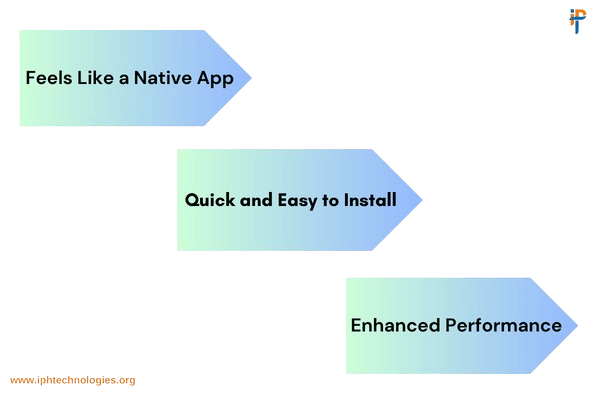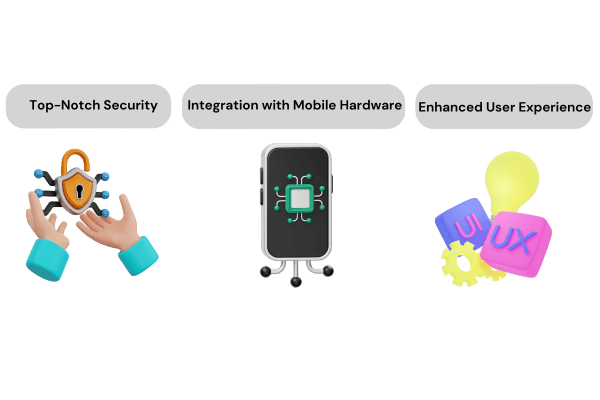Progressive web apps vs Native apps?

Progressive Web Apps vs Native Apps This has been a regular and controversial topic for developer project managers and tech enthusiasts. Debating which is best will not solve the problem.
If you consider a website built using web technologies but it functions like an app, well, that is an example of a progressive app.
Tech Fact - 60% of all web traffic coming from mobile
If you look at the Play Store or App Store, approximately more than a million apps are offering almost the same features in your niche.
Developing apps for different platforms like Android app development or iOS app development costs more and takes a lot of effort and time to develop. In contrast, progressive apps can run on multiple platforms and devices from a single codebase.
Discovering Progressive Web Apps is quite easy.
A PWA can be discovered by typing specific queries or keywords in your favorite browsers like Chrome, Safari, or any other, and accessed immediately through a browser.
What are Native Apps?
Native apps are like normal apps, but the difference from web apps is that native apps are developed specifically for certain devices like Mac, iOS, or Android.
This allows apps to better utilize device resources like GPS, camera, and kernel. Moreover, they can save data on the device and seamlessly interact with other native apps on the same platform to enhance performance and security.
Native apps can be downloaded via app stores like the Apple App Store or Google Play Store. Building a native app can be extensive work because you have to target both iOS and Android platforms and manage two codebases. Therefore, developing native apps also costs money.
Tech Fact - According to Clutch.co, half of the small firms have a mobile app.
They are not interoperable, so a native application made for iOS will only operate on iOS devices, and a native application made for Android will only operate on Android devices.
This is the main reason why the app development team takes more time to build a native app, as the scope of bugs is comparatively higher than with developing progressive web apps.
Tech Facts- Amount of application users is expected to amount to 1,033.3m users in 2024
Benefits of Progressive Web Apps

Progressive Web Apps vs Native Apps, Each has its benefits. Let's delve into the benefits of Progressive Web Apps and what PWAs have to offer.
Feels Like a Native App: Nowadays, users tend to prefer web browsers or traditional apps depending on their needs.
Progressive Web Apps (PWAs) are designed to resemble native apps and have a similar impact on user experience. The main difference is that PWAs are developed using web technologies and are not hosted locally.
It is easy to discover Progressive Web Apps by optimizing a few keywords that you believe users might enter in a web browser to access your web app.
The benefits of a PWA are its speed, the capability to function offline, and the ability to be used directly from the browser.
People can add them to the home screen of their mobile device like a typical native app, skipping app marketplaces.
Avoiding reliance on the Apple App Store and Google Play Store is a plus with Progressive Web Apps Development.
Quick and Easy to Install: When it comes to installing Progressive Web Apps, you just need to click on the dedicated "create shortcut" button on your web browser.
Congratulations! You have successfully installed a PWA on your phone. PWAs perform and act the same as native apps, but they take up less space on your device, thus saving you valuable storage.
Additionally, you don't need to install the PWA to use it—it can be accessed through a URL as well.
Due to streamlined access, users find them credible, adaptable, and dependable.
Plus, the developer of a PWA doesn't have to spend any money on publishing on the browser, unlike native apps where you have to pay a fee to the app store for publishing your apps. Sharing a PWA is easy too—you just have to share the URL.
Enhanced Performance: Progressive Web Apps can perform efficiently, work like a website, and store and serve text, images, and other content.
Because PWAs utilize JavaScript files that run independently from the main browser thread and proactively handle the caching of assets, they can provide much better performance than classic web apps.
But the load speed of your progressive web apps matters; you have to keep a check on core web vitals and best practices for speed optimization.
Benefits of Native Apps

Top-Notch Security: When it comes to security, native apps outperform progressive web apps. This is because native apps are specifically developed for dedicated devices, which means they follow all security protocols built within the device.
For example, iOS apps can use Apple's Face ID for user authentication without the developers having to create this feature from scratch. App stores like the Apple App Store and Google Play Store provide an additional layer of security.
These app stores have strict security guidelines and ensure that all published apps are safe and secure for users.
If they detect any suspicious apps, they take immediate action to protect users by implementing stronger security measures against those apps.
Integration with Mobile Hardware: Mobile native apps can easily utilize device resources to leverage hardware features like GPS, camera, microphone, and biometrics.
On the other hand, web-based applications might require additional permissions or plugins to access these same features, which can create more hurdles for developers and users alike leveraging these abilities within a web browser can be challenging.
Enhanced User Experience: Native apps provide a smooth and uninterrupted user experience (UX), which is one of their most significant advantages.
The user-friendly design of these apps can lead to customer satisfaction and loyalty.
When choosing between Progressive Web Apps vs Native Apps, it's important to consider this benefit. Each native platform has its design guidelines, and the UI/UX process is unified and specific to a separate operating system.
Additionally, your team won't have to worry about modifying the size and resolution of graphics for each device, saving them time and effort.
Also read- Comparing Cross-Platform vs Native App Development: Advantages and Drawbacks
Comparing Progressive Web Apps vs Native Apps:
Both Progressive Web Apps and native apps offer distinct benefits and considerations that influence how users interact with content and services.
To make informed decisions about app development strategies, it is crucial to understand the differences between these two approaches.
Let's delve into the unique characteristics of PWA vs native apps to highlight their strengths and help you determine which option aligns best with your objectives.
| Progressive Web Apps | Native App |
|---|---|
| Security Risks | Fewer Security risks |
| Lower Storage Requirements | Better User Experience |
| Can Be Accessible by Web browsers | Need To Be Installed On Devices Locally |
| Fast Time To Market | Slow Time to Market |
| Need SEO for visibility | App store visibility with ASO |
| Platform Independent | Platform Dependent |
| No Installation Required | Installation Required |
| Free To Publish | Certain fees for Publishing on the App Store |
What Should You Choose: PWA vs Native App?
When choosing between Progressive Web Apps vs Native Apps, it's crucial to consider each option's strengths and drawbacks and evaluate how they align with your vision.
Choose Native App:
- Choose native if you want to take full advantage of device resources like GPS, sensors, and cameras.
- Publishing apps on app stores increases reliability, and native apps offer more security options.
- Choose native if you want to develop an app with high engagement and top-notch UI and UX design.
Choose PWAs:
- Choose PWAs if you want to develop and publish with less time and money than traditional apps.
- Choose PWAs if your product does not require a dedicated app, while still reaching a wide audience and improving brand awareness and SEO.
- Progressive Web Apps (PWAs) do not require any download and let you engage with the user through push notifications
Conclusion
When choosing between Progressive Web Apps vs Native Apps, assess your project needs. Native Apps provide full access to device features, top-notch security, and a great user interface.
PWAs streamline development time and costs, provide a responsive app-like experience, and are easily discoverable via web browsers. Choose based on your project requirements, budget, and target audience for the best user experience.
FAQ

Read more blogs

Time and Cost of Developing an AI like ChatGPT: Key Factors Explored
Explore the factors influencing the time and cost of developing an AI model like ChatGPT. Understand key considerations for successful AI ap

Guide to Successful Real Estate App Development: Features, Technologies, and More
Explore the advantages of developing a real estate app, key features, technologies to employ, and the importance of collaborating with a Rea

Custom vs. Template-Based Website Development: A Comprehensive Cost Comparison Guide
Explore the costs, pros, and cons of custom website development vs. template-based solutions. Make an informed decision for your online pres
